Scott Slucher Reviews Cormac McCarthy's No Country for Old Men
When No Country For Old Men hit the bookstores a couple of weeks ago, it set off the latest in a series of pitched battles between scholars, critics, and fans over the merit of Cormac McCarthy’s latest novel, especially in relation to his eight previous works, the most recent of which was Cities Of The Plain, the concluding chapter of the Border Trilogy. McCarthy, arguably our country’s greatest living novelist, brings out great passion in both his champions, who liken him to Faulkner and Hemingway, and his detractors, who, among other things, find him pretentious despite his great gifts. McCarthy himself stays out of the fray, letting the work speak for itself, and in No Country for Old Men, he’s thrown us all one hell of a curve ball.
The story is set in the Big Bend area of West Texas in 1980, and focuses mostly on three characters: Llewelyn Moss, a Viet Nam vet whose weekend hunting trip leads him to the scene of a botched drug deal and 2.4 million dollars in cash, Anton Chigurh, a mysterious bounty hunter of sorts who is on Moss’s trail, armed with a pneumatic stun gun used for slaughtering cattle, and Sheriff Ed Tom Bell, the old man of the title, haunted by an act of war-time cowardice, and determined to find Moss before Chigurh gets him.
Constructed as a kind of crime novel, the story hits the ground running at break-neck speed, hurtling everyone to their respective fates and giving the reader little time to catch a breather or tally the body count until the final, meditative passage. At first, Moss appears to get away with the money, but a lapse in judgment sets off a bloody chain of events that sends him and his wife on the run for their lives.
The action, beautifully constructed, centers on a sometimes complicated chase that includes two competing bands of drug enforcers, a former special-forces officer turned hired gun, and Chigurh. Bringing up the rear, after each battle, is Sheriff Bell, who always arrives as the body bags are being zipped and sent to the morgue - about two dozen in all, mostly at the hand of Chigurh, whose weird ethic forms a counter-weight to the good-ol-days moralizing of Sheriff Bell.
Chigurh is the great force in this book - cruelly logical and unsentimental. One victim describes him as “a peculiar man. You could even say that he has principles. Principles that transcend money or drugs or anything like that.” Sheriff Bell also senses something different about this new breed that has pushed him to the limits of his capacity. “I used to say they were the same ones we’ve always had to deal with. Same ones my grandaddy had to deal with. Back then they was rustlin cattle. Now they’re runnin dope. But I don’t know as that’s true no more.… I ain’t sure we’ve seen these people before. Their kind. I don’t know what to do about em even. If you killed em all they’d have to build a annex on to hell.”
As Moss’s pursuers close in on him, he exhibits a stoic nobility that makes him all the more likeable, but much like John Grady Cole, in All The Pretty Horses, there is a youthful foolishness in his self-confidence that has tragic consequences.
Release from all this tension comes in the form of italicized monologues by Sheriff Bell. They form chapter headings and many of them come off as curmudgeonly rants, but taken as a whole, they form the soul of the novel, filling in the cracks of the story, adding depth to the action. As Sheriff Bell muses on what has happened in his life and what he sees coming, he becomes convicted that whatever it is that he’s been chasing, it’s pure evil and too much for him to stop. Finally, the only comfort or hope that he can find is in his love for his wife Loretta.
The story concludes with a haunting passage that seems to suggest that in a world that is literally going to hell, where old codes of honor and duty get brushed aside like crumbs from a table, perhaps the only thing that can save us is the love of one good person.
Only time will tell where No Country For Old Men rests in the McCarthy canon, but one thing is certain - at 72 years of age, Cormac McCarthy is still at the top of his game.


